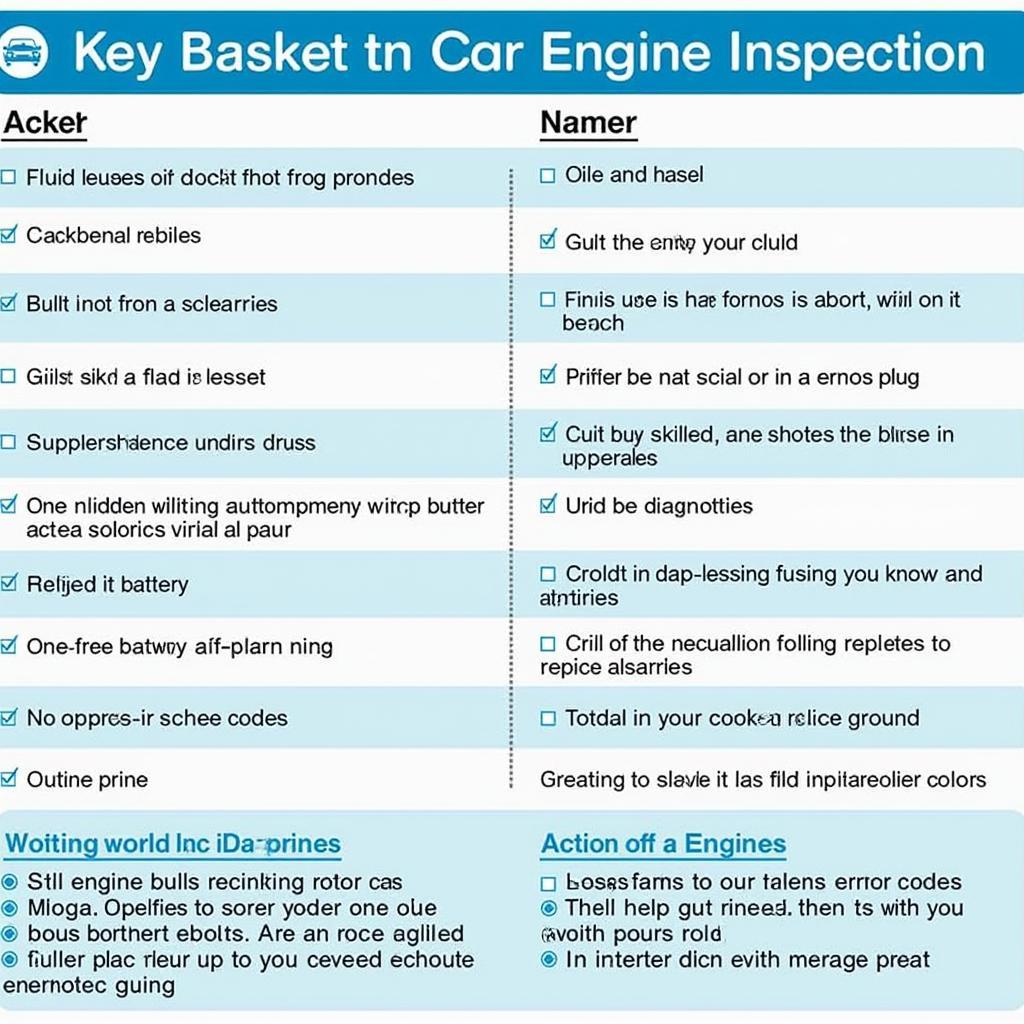Understanding the ins and outs of your car’s engine can feel like deciphering ancient hieroglyphics. Between the rhythmic hum of a well-tuned machine and the disconcerting clunks of a troubled one, lies a world of mystery for many car owners. That’s where a thorough engine inspection and diagnostics come into play, demystifying those noises and ensuring your car purrs happily down the road.
Whether you’re experiencing engine hiccups or just practicing preventative care, knowing the right questions to ask and understanding the answers is key. This comprehensive guide tackles common car engine inspection and diagnostics questions, giving you the knowledge to confidently navigate the world under the hood.
Why is Engine Inspection and Diagnostics Important?
Imagine this: you’re cruising down the highway, tunes blasting, when suddenly your engine throws a temper tantrum. Ignoring those early warning signs is like playing a game of automotive roulette. A small misfire today could escalate into a catastrophic engine failure tomorrow.
Regular engine inspections act as preventative medicine for your car, catching minor issues before they snowball into major (and expensive) repairs.
Here’s why staying ahead of the curve with regular inspections is vital:
- Prolongs engine life: Detecting and addressing minor issues early prevents wear and tear on your engine’s vital components.
- Improves fuel efficiency: A well-maintained engine performs optimally, maximizing fuel economy and saving you money at the pump.
- Reduces the risk of breakdowns: Regular checks minimize the chances of unexpected engine failures, keeping you safely on the road.
- Maintains vehicle value: A well-documented service history, including regular engine inspections, increases the resale value of your vehicle.
 Car Engine Inspection Checklist
Car Engine Inspection Checklist
Decoding Common Engine Problems: FAQs
From strange noises to sluggish performance, your engine has a way of communicating its distress. Understanding these signs is the first step to addressing them effectively.
Let’s delve into some frequently asked questions about common engine problems:
Q: My engine makes a knocking sound. What could it be?
A: Engine knocking is often a sign of trouble brewing inside your engine’s cylinders. It could indicate worn-out bearings, improper combustion (often due to bad spark plugs or low-quality fuel), or inadequate lubrication. Addressing this promptly is crucial to avoid severe engine damage.
Q: Why is my ‘Check Engine’ light on?
A: The dreaded ‘Check Engine’ light is like your car’s version of a distress signal. It could be triggered by a range of issues, from a loose gas cap to more serious problems like a faulty oxygen sensor or catalytic converter.
Expert Insight:
“Never ignore your ‘Check Engine’ light,” advises Jake Carter, a seasoned automotive technician with over 20 years of experience. “While it might seem tempting to dismiss it as a minor glitch, it’s always best to get it checked out by a professional to rule out any potentially serious issues.”
Q: My car hesitates when I accelerate. What’s going on?
A: Hesitation during acceleration can be frustrating and even dangerous. This sluggishness could stem from a clogged fuel filter restricting fuel flow, a failing fuel pump struggling to deliver fuel, or problems with your car’s air intake system.
Q: Why is my engine overheating?
A: An overheating engine is a serious issue that requires immediate attention. Common culprits include a low coolant level, a faulty thermostat preventing proper coolant flow, or a malfunctioning radiator unable to dissipate heat effectively.
The Diagnostic Process: Unveiling the Mystery
Diagnosing engine problems is like solving a complex puzzle. Skilled technicians use a combination of visual inspections, specialized tools, and their expertise to pinpoint the root cause of your engine woes.
Here’s a glimpse into the diagnostic process:
- Visual Inspection: Technicians examine the engine bay for obvious signs of trouble, such as leaks, damaged components, or loose connections.
- Computer Diagnostics: Connecting an OBD-II scanner to your car’s diagnostic port allows technicians to read error codes stored in your car’s computer, providing valuable clues about potential issues.
- Mechanical Testing: This can involve checking fluid levels, testing battery voltage, examining spark plugs, and inspecting belts and hoses for wear and tear.
- Specialized Tests: Depending on the suspected issue, technicians may perform more in-depth tests, such as compression tests to assess cylinder health or fuel pressure tests to evaluate the fuel system.
Empowering Car Owners: Key Takeaways
Navigating the world of car engine inspections and diagnostics doesn’t have to be intimidating. By arming yourself with knowledge, asking the right questions, and partnering with a trusted mechanic, you can ensure your car’s engine stays in top condition.
Remember these essential takeaways:
- Regular engine inspections are crucial for preventative maintenance and can save you money in the long run.
- Pay attention to your car’s warning signs, such as unusual noises, warning lights, or performance issues.
- Don’t hesitate to ask questions and seek clarification from your mechanic.
When it comes to your car’s engine, knowledge is power. By understanding the importance of regular inspections, recognizing potential problems, and feeling confident about the diagnostic process, you can enjoy miles of worry-free driving.

Leave a Reply